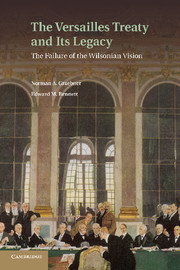Book contents
- Frontmatter
- Contents
- Preface
- 1 The International Order on Trial
- 2 The Road to Paris: 1917???1918
- 3 Versailles: A Study in Arrogance
- 4 The Retreat to Utopia
- 5 Manchuria and the Triumph of Non-Recognition
- 6 The Rise of Hitler
- 7 Challenge of the Dictators
- 8 The Elusive Response
- 9 Munich: The Continuing Escape from Reality
- 10 The Road to Prague
- 11 The Soviet Quest for Collective Security
- 12 The Coming of War: 1939
- Bibliography
- Index
- References
1 - The International Order on Trial
Published online by Cambridge University Press: 07 October 2011
- Frontmatter
- Contents
- Preface
- 1 The International Order on Trial
- 2 The Road to Paris: 1917???1918
- 3 Versailles: A Study in Arrogance
- 4 The Retreat to Utopia
- 5 Manchuria and the Triumph of Non-Recognition
- 6 The Rise of Hitler
- 7 Challenge of the Dictators
- 8 The Elusive Response
- 9 Munich: The Continuing Escape from Reality
- 10 The Road to Prague
- 11 The Soviet Quest for Collective Security
- 12 The Coming of War: 1939
- Bibliography
- Index
- References
Summary
I
In the modern world, nations have existed as members of an international community that offered security and enhanced the possibilities of national existence. What held the separate entities in a stable relationship with one another was the freedom of every nation to respond, alone or with others, to any threat to the established order. This balancing system required the existence of a preponderance of power that was prepared, under duress, to confront any unwanted assaults on the established order. In recent centuries, the European balance of power had always triumphed over any assaults on the status quo that became too ambitious. France under Louis XIV, and later Napoleon, sought drastic changes in the map of Europe; in both endeavors, France went down in total defeat. If the balance of power failed to prevent wars, it limited their consequences, and thereby preserved the existing order of power, encouraging restraint and accommodation. With good reason, America’s Founding Fathers and those who followed them placed their faith in the balancing system as the surest guarantee of the nation’s well-being and security.
- Type
- Chapter
- Information
- The Versailles Treaty and its LegacyThe Failure of the Wilsonian Vision, pp. 1 - 20Publisher: Cambridge University PressPrint publication year: 2011

